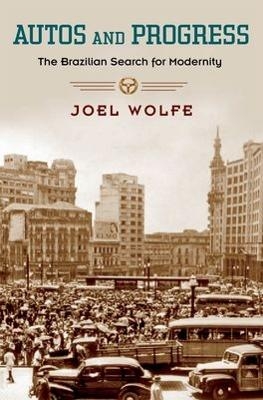
Autos and Progress
The Brazilian Search for Modernity
Seiten
2010
Oxford University Press Inc (Verlag)
978-0-19-517456-4 (ISBN)
Oxford University Press Inc (Verlag)
978-0-19-517456-4 (ISBN)
Autos and Progress studies the automobile as both a tool and a cultural symbol of Brazil's status as a modern "developed" nation. As such it addresses debates on state-making, the role of multi-national corporations in the region, middle-class consumerism, working-class politics, and sports and leisure in the crafting of national identity, among others. Such a study is key for understanding the twentieth century because auto-based transportation became the central facet of Brazilian attempts to gain control over its massive national space. The most obvious expressions of this include the building of Brasília to be the new, interior national capital, the extensive road building throughout the Amazon in the 1970s, the nation's development of one of the world's leading alternative fuel industries, Brazilian dominance in world Formula One racing, and the fact that the current president, Luiz Inácio Lula da Silva, is a former auto worker and trade union leader.
This focus on Brazilians' fascination with automobiles and their reliance on auto production and consumption as keys to their economic and social transformation, explains how Brazil -- which enshrined its belief in science and technology in its national slogan of Order and Progress -- has differentiated itself from other Latin American nations. This embrace of automobility allowed the Brazilian elite to use industrialism and the increased mobility of an auto-based society to attempt to remake the nation's poor into a more homogeneous population. Autos and Progress engages key issues in the Brazil around the meaning and role of race in society and also addresses several classic debates in Brazilian studies about the nature of Brazil's great size and diversity and how they shaped state-making.
Autos and Progress unifies Brazilian economics, politics, and culture in the twentieth century. It provides a unique historical context for understanding Brazilian modernism in politics and culture. Moreover, by analyzing the origins of auto-oriented industrialism and consumerism, the book is an economic, cultural and social history of Brazilian attempts to remake the nation into a middle-class democracy. This aspect of the study presents a new interpretation for the rise of Brazil's New Unionism, which was born in Brazil's auto, truck, and bus factories. It also provides important context for understanding the place of the Partido dos Trabalhadores (Workers' Party) in national politics and culture, and the rise of President Luiz Inácio Lula da Silva, a former auto worker.
This focus on Brazilians' fascination with automobiles and their reliance on auto production and consumption as keys to their economic and social transformation, explains how Brazil -- which enshrined its belief in science and technology in its national slogan of Order and Progress -- has differentiated itself from other Latin American nations. This embrace of automobility allowed the Brazilian elite to use industrialism and the increased mobility of an auto-based society to attempt to remake the nation's poor into a more homogeneous population. Autos and Progress engages key issues in the Brazil around the meaning and role of race in society and also addresses several classic debates in Brazilian studies about the nature of Brazil's great size and diversity and how they shaped state-making.
Autos and Progress unifies Brazilian economics, politics, and culture in the twentieth century. It provides a unique historical context for understanding Brazilian modernism in politics and culture. Moreover, by analyzing the origins of auto-oriented industrialism and consumerism, the book is an economic, cultural and social history of Brazilian attempts to remake the nation into a middle-class democracy. This aspect of the study presents a new interpretation for the rise of Brazil's New Unionism, which was born in Brazil's auto, truck, and bus factories. It also provides important context for understanding the place of the Partido dos Trabalhadores (Workers' Party) in national politics and culture, and the rise of President Luiz Inácio Lula da Silva, a former auto worker.
Joel Wolfe is Associate Professor of History at University of Massachusetts at Amherst. He is the author of Working Women, Working Men: Sao Paulo and the Rise of Brazil's Industrial Working Class, 1900-1955 (Duke UP, 1993).
INTRODUCTION; EPILOGUE TROPICAL MODERNITY IN A GLOBALIZED SPACE; NOTES
| Erscheint lt. Verlag | 4.2.2010 |
|---|---|
| Zusatzinfo | 26 halftones |
| Verlagsort | New York |
| Sprache | englisch |
| Maße | 231 x 152 mm |
| Gewicht | 408 g |
| Themenwelt | Geisteswissenschaften ► Geschichte ► Regional- / Ländergeschichte |
| Geschichte ► Teilgebiete der Geschichte ► Kulturgeschichte | |
| Geschichte ► Teilgebiete der Geschichte ► Wirtschaftsgeschichte | |
| Technik ► Fahrzeugbau / Schiffbau | |
| ISBN-10 | 0-19-517456-9 / 0195174569 |
| ISBN-13 | 978-0-19-517456-4 / 9780195174564 |
| Zustand | Neuware |
| Haben Sie eine Frage zum Produkt? |
Mehr entdecken
aus dem Bereich
aus dem Bereich
der stille Abschied vom bäuerlichen Leben in Deutschland
Buch | Hardcover (2023)
C.H.Beck (Verlag)
23,00 €
vom Mittelalter bis zur Gegenwart
Buch | Softcover (2024)
C.H.Beck (Verlag)
12,00 €
eine Geschichte der Welt in 99 Obsessionen
Buch | Hardcover (2023)
Klett-Cotta (Verlag)
22,00 €


